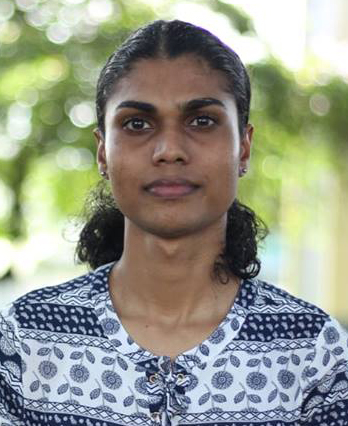Alessandra Hereman is a young transgender woman who is studying at the University of Guyana
“It is not our differences that divide us. It is our inability to recognize, accept, and celebrate those differences.”
Audre Lorde
When my mother gave birth to me the doctor and nurses said I was ‘male’. However, as I grew up, I did not identify with or adopt anything masculine. As early as age four I knew I was different.
My name is Alessandra Hereman and I am a trans woman. This means I was assigned male at birth but identify and live as a woman of trans experience.
While still in nursery school I played with dolls and cross-dressed. As I transitioned into primary school I avoided rough outdoor games. I still have memories of my male cousins and other family members making fun of my feminine behaviour. There was no psychologist, child psychiatrist or gender specialist. It was just me and my thoughts: I am a girl… but I have a penis… girls don’t have penises… I want long hair… girls have a vagina… can I have a baby?
As I grew older, I stopped playing with dolls and dressing in a feminine way, but I still experienced bullying because of my feminine disposition. In my later primary school years, I was introduced to the term ‘antiman’ and the things an antiman does like “suck cock” and “bugger”. They said I was an antiman.
When I began high school, fellow students and school vendors bullied me. I experienced name-calling and verbal harassment. I assumed that this mistreatment was a result of me being an antiman and that I deserved to be treated this way because being an antiman was a bad thing.
Accepting my transgender self
It wasn’t until a few years after high school that I came across the concepts ‘transgender’ and ‘gender dysphoria’. The term transgender is used to describe individuals whose gender identity or sense of self is different from the sex they were assigned at birth. The more I researched this concept, the more I became aware of who I was, and the more I started to identify as transgender. From there, everything else followed: growing my hair, changing my name and coming out as trans to some close friends. Trans experiences are different – there is no right or wrong way to be transgender. Not all trans people undergo hormone therapy or legally change their name or opt for gender affirming surgeries.
It’s been eight years since I first identified as a trans woman. It has been a liberating yet challenging journey. In 2012, I legally changed my name. The process was a relatively smooth one. The Justice of the Peace and staff told me what I had to do without questioning the name change. The clerk at the High Court also advised me to go and change my identification card at the Guyana Elections Commission. The Guyanese constitution does not allow trans or gender non-confirming people to change their gender markers on identification documents, nevertheless, the ability to change my name was/is a small victory for me.
Advocating for acceptance
I work for one of USAID health projects in Guyana, serving the needs of those who are made vulnerable to HIV, discrimination and violence because of their situations — family rejection, homelessness or unemployment. I work closely with healthcare providers and social protection officers to address stigma and discrimination and increase gender inclusivity and sensitivity in healthcare and social services delivery.
As a trans woman I am grateful for the support I receive from the people who accept me. Tolerance is for starters, but I prefer acceptance. I see tolerance as the halfway house between rejection and acceptance. Unfortunately, in most instances, tolerance does not shift a dominant status quo, it exists to stymie social progress, because all we do is “tolerate” without addressing differences, without recognizing, accepting, and celebrating those differences.
When people discriminate or stigmatise, it is often because they don’t understand a person or situation and their actions are guided by prejudice and stereotypes. But when I facilitate discussions around gender and sexuality, explaining that both exist on a spectrum, I can sense a shift in people’s attitudes. For me, acceptance is where people have an understanding of and a respect for diversity and they value inclusion.
In September I will be entering my final academic year at the University of Guyana, completing my undergraduate studies in Sociology. I am always conscious of the privileges I have, as I know the majority of my trans siblings experience greater difficulties in the areas of family, education, employment and relationships. My trans-sisters in Berbice have shared their experiences of abuse by law enforcement, including—wrongful detention because they happen to be trans and inhumane and degrading punishments like being stripped naked and forced to model.
Trans women live at the intersection of multiple oppressions: we are often victims of trans-misogyny and gender discrimination. We are robbed of educational opportunities because of a homophobic and transphobic learning environment, which results in unemployment, homelessness and the inability to access resources. These social determinants in turn negatively affect our health. According to reports, Trans women are 49 times more likely to be living with HIV than the general population; in the Americas including Latin America and the Caribbean, the average life expectancy of trans women is 35 years, and trans women have a global suicide rate between 20%-50%.
Hoping for a brighter future
We have a long way to go in Guyana. Progressive legislation does not automatically mean a progressive society. India, for example, has progressive and inclusive legislation that recognises trans people as a third gender; yet trans people continue to face social exclusion and marginalisation. But I remain optimistic that through education and dialogue we can transform minds and attitudes. I strongly believe, however, that it is the state’s responsibility to protect the fundamental human rights of its citizens. People of trans experience, should not be criminalised for the way they choose to manifest their gender. The spotlight is again on our community as the Guyana cross-dressing law enters its final appeal in the Caribbean Court of Justice in the case McEwan et al. vs Attorney General of Guyana. All we are asking for is that the state recognises us as trans people and respects our fundamental human right to freedom of expression. Cross-dressing is prohibited by Guyanese law when done for an “improper purpose”. I don’t see anything improper about wearing garments that make you feel like yourself. I hope that the Caribbean Court of Justice recognises and respects our fundamental human right to freedom of expression and offers a ruling in our favour.


